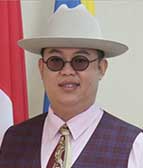Opportunities and Challenges in the Implementation of Plurality - Majority (District) Electoral System for Strengthening the Indonesian Presidential System
Downloads
Presidential government system has its own disadvantages, one of them is the possibility a minority president presence in this system, namely a president who is not supported by a parliamentary majority, even though the President has a strong mandate from public, but with a minority position, the government's agenda which carried out by the president could be hampered by parliament or the legislature, therefore it is needed a coalition government. The combination of a presidential system with a multi-party system is difficult to implement because whoever the president is elected will be encountered with a certain condition that it is impossible to support him in parliament without forming a coalition. In order to respond the problem in strengthening the presidential system in Indonesia, the author offers a majority general election system or district system (first Past the Post) as an effort to create an effective and responsible government. This is a legal study which used two approaches, namely statutory approach and conceptual approach. Based on the results of study, it can be concluded that the majority system was more appropriate for creating an effective and responsible government because it could encourage the simplification of political parties and the responsibilities of people's representatives to the voters in each district.
Downloads
Abdul Bari Azed (ed), ‘Sistem-Sistem Pemilihan Umum: Suatu Himpunan Pemikiran' (Fakultas Hukum Universitas Indonesia 2000).
Achmad Baidowi, Di Balik Penyusunan UU Pemilu: Proses Negosiasi Dan Konfigurasi Antar Fraksi (SUKA-Press 2018).
Agus Riwanto, Desain Sistem Pemerintahan Anti Korupsi:Konsep Pencegahan Korupsi Politik Dalam Sistem Pemerintahan, Partai Politik Dan Pemilu (Setara Press 2018).
””, Hukum Partai Politik Dan Hukum Pemilu Di Indonesia (Thafa Media 2016).
Antoine Cazals, Florian L´eon, Perception of political instability in election periods: Evidence from African firms, Journal of Comparative Economics, <https://doi.org/10.1016/j.jce.2022.09.003>
Arend Lijphart, ‘Constitusional Choices For New Democracies' (1991) 2 Journal of Democracy.
Asfar M, ‘Distrik Prefensial: Alternatif Sistem Pemilu Di Masa Depan' (2003) 5 Jurnal PSPK Penguatan Kendali Rakyat.
Cassidy Reller, Anthony Anderson, Thad Kousser, Are elite cues necessary to drive the "Winner Effect” on trust in elections?, (2022) 80 Electoral Studies.[102541].
Firdaus, Constitutional Engineering (Yrama Widya 2015).
Fritz Edward Siregar, Menuju Peradilan Pemilu (Themis Publishing 2019).
Gotfridus Goris Seran, Kamus Pemilu Populer: Kosa Kata Umum, Pengalaman Indonesia Dan Negara Lain (Graha Ilmu 2013).
Guy S. Goodwin-Gill, ‘Pemilu Jurdil: Pengalaman Dan Standar Internasional' (PIRAC dan The Asia Foundation 1999).
Harun Husein, Pemilu Indonesia: Fakta, Angka, Analisis Dan Studi Banding (Perludem 2014).
Janedri M. Gaffar, Politik Hukum Pemilu (Konpress 2012).
Jose Antonio Cheibub, Presidential, Parliamentarism and Democracy (Cambridge University Press 2007).
Juan J. Linz, ‘The Perils of Presidentialism' (1990) 1 Journal of Democracy.
Khairul Fahmi, Pemilihan Umum Dalam Transisi Demokrasi: Kompilasi Catatan Atas Dinamika Pemilu Dan Pilkada Di Era Reformasi (Rajawali Pers 2016).
Kostanca Dhima [et.,al.], Permissive electoral systems and descriptive representation, Electoral Studies (2021) 73.
Larry Diamond dan Marc F. Plattner, Electoral Systems and Democracy (The Johns Hopkins University Press 2006).
Lucky Sandra Amalia, Evaluasi Pemilu Legislatif 2014: Analisis, Proses Dan Hasil (Pustaka Pelajar 2016).
Mustafa Lutfi and M Iwan Satriawan , Risalah Hukum Partai Politik Di Indonesia (UB Press 2016).
Moch. Nurhasim, Fisibilitas Sistem Pemilu Campuran: Upaya Memperkuat Sistem Presidensial Di Indonesial (Lembaga Ilmu Pengetahuan Indonesia 2014).
Mohammad Syaiful Aris, ‘Penataan Sistem Pemilihan Umum Yang Berkeadilan Untuk Penguatan Sistem Presidensiil Di Indonesia' (2018) 33 Yuridika Fakultas Hukum Universitas Airlangga.
””, Hukum Pemilu: Filosofi Dan Prinsip Pemilihan Umum Dalam UUD NRI 1945 (Setara Pers 2021).
””, Pemilu Dan Sistem Presidensiil Indonesia: Konsep Dan Desain Pemilihan Umum Alternatif Untuk Penguatan Sistem Presidensiil (Setara Pers 2022).
Muhammad Asfar, ‘Model-Model Sistem Pemilihan Di Indonesia, Pusat Studi Demokrasi Dan HAM Bekerjasama Dengan Partnership for Governance Reform In Indonesia' (2002).
Nazaruddin Syamsuddin, ‘Sistem-Sistem Pemilihan Umum Suatu Himpunan Pemikiran: Makna Sistem Distrik Dan Perwakilan'.
Nils-Christian Bormann and Matt Golder, Democratic Electoral Systems around the world, (2022) 78 Electoral Studies.
Pipit R Kartawidjaja, Catatan Atas Pemilu Legislatif 2004 (Inside 2004).
””, Matematika Pemilu (Inside 2004).
””, Alokasi Kursi: Kadar Keterwakilan Penduduk Dan Pemilih (ELSAM 2003).
Pipit R. Kartawidjaja and dan M. Faishal Aminuddin, Demokrasi Electoral (Bagian I) Perbandingan Sistem Dan Metode Dalam Kepartaian Dan Pemilu (Sindikasi Indonesia 2014).
Pipit R. Kartawidjaja dan Mulyana W. Kusumah, Sistem Pemilu Dalam Konstitusi (KIPP Eropa 2002).
Pipit R Kartawidjaja dan Sidik Pramono Akal-Akalan Daerah Pemilihan (Perludem 2007).
Ramlan Surbakti, Perekayasaan Sistem Pemilihan Umum: Untuk Pembangunan Tata Politik Demokratis (Kemitraan 2008).
Rozali Abdullah, Mewujudkan Pemilu Yang Berkualitas (Pemilu Legislatif) (Rajawali Pers 2009).
Sankar Mukhopadhyay, Elections have (health) consequences: Depression, anxiety, and the 2020 presidential election, (2022) 47 Economics and Human Biology.
Scott Mainwaring and Matthew Sugart ‘Juan Linz, Presidentialism and Democracy: A Critical Apprasial' (1993).
Titik Triwulan Tutik, Konstruksi Hukum Tata Negara Indonesia Pasca Amandemen UUD 1945 (3., Kencana 2015).
Yusril Ihza Mahendra, ‘Sistem-Sistem Pemilihan Umum Suatu Himpunan Pemikiran; Pemilu Sistem Distrik: Pengalaman Malaysia'.
Copyright (c) 2022 Mohammad Syaiful Aris

This work is licensed under a Creative Commons Attribution 4.0 International License.
















